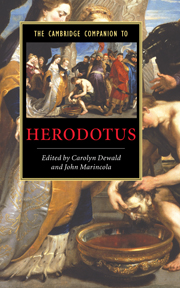Book contents
- Frontmatter
- Introduction
- 1 Herodotus and the poetry of the past
- 2 Herodotus and his prose predecessors
- 3 Herodotus and tragedy
- 4 The intellectual milieu of Herodotus
- 5 Meta-historiē: Method and genre in the Histories
- 6 The syntax of historiē: How Herodotus writes
- 7 Speech and narrative in the Histories
- 8 Herodotus, Sophocles and the woman who wanted her brother saved
- 9 Stories and storytelling in the Histories
- 10 Humour and danger in Herodotus
- 11 Location and dislocation in Herodotus
- 12 Herodotus and the natural world
- 13 Herodotus and Greek religion
- 14 Warfare in Herodotus
- 15 Herodotus, political history and political thought
- 16 Herodotus and the cities of mainland Greece
- 17 An alternate world: Herodotus and Italy
- 18 Herodotus and Persia
- 19 Herodotus and foreign lands
- 20 Herodotus' influence in antiquity
- Glossary
- Timeline
- Bibliography
- Index
- Series List
14 - Warfare in Herodotus
Published online by Cambridge University Press: 28 January 2007
- Frontmatter
- Introduction
- 1 Herodotus and the poetry of the past
- 2 Herodotus and his prose predecessors
- 3 Herodotus and tragedy
- 4 The intellectual milieu of Herodotus
- 5 Meta-historiē: Method and genre in the Histories
- 6 The syntax of historiē: How Herodotus writes
- 7 Speech and narrative in the Histories
- 8 Herodotus, Sophocles and the woman who wanted her brother saved
- 9 Stories and storytelling in the Histories
- 10 Humour and danger in Herodotus
- 11 Location and dislocation in Herodotus
- 12 Herodotus and the natural world
- 13 Herodotus and Greek religion
- 14 Warfare in Herodotus
- 15 Herodotus, political history and political thought
- 16 Herodotus and the cities of mainland Greece
- 17 An alternate world: Herodotus and Italy
- 18 Herodotus and Persia
- 19 Herodotus and foreign lands
- 20 Herodotus' influence in antiquity
- Glossary
- Timeline
- Bibliography
- Index
- Series List
Summary
Towards the beginning of the fifth century BCE the Ionian philosopher Heraclitus observed that 'war is the father of all things' (VS 22 B 53); perhaps he was influenced by the contemporary turmoil in Ionia, as the burdens of Persian rule increasingly pressed down the eastern Greeks. As John Gould remarks, however, Heraclitus' statement reveals a central truth that in the early twenty-first century we also acknowledge. Like Heraclitus and after him Herodotus, we too see war as 'the ultimate expression and at the same time the ultimate theatre for the “display” of “great and astonishing achievements”, a theatre where success and failure are visible to all and awesome in their consequences'. It was Herodotus' goal that these 'great and astonishing achievements' should not be forgotten, as he notes in the preface to his Histories. Yet while he recognised the heroism of men in battle, he was also an acute and critical observer of the horror of war and of its ironies - including the bitter irony that some conflicts were necessary, while others were not.
- Type
- Chapter
- Information
- The Cambridge Companion to Herodotus , pp. 209 - 223Publisher: Cambridge University PressPrint publication year: 2006
- 4
- Cited by



